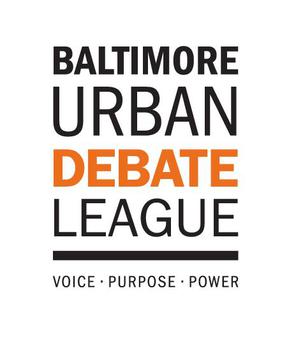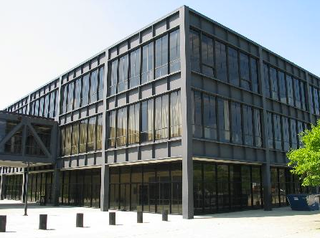
The National Speech and Debate Association (NSDA) is the largest interscholastic speech and debate organization serving middle school and high school students in the United States. It is also the national authority on public speaking and debate.
The Canadian University Society for Intercollegiate Debate is the national organization which governs all English language competitive university debating and public speaking in Canada. It sanctions several official annual tournaments and represents Canadian debating domestically and abroad. Its membership consists of student debating unions, sanctioned by their respective universities, from across Canada. CUSID has been described as "a student-run, parliamentary debate league with close ties to the American Parliamentary Debate Association".

Debate is a process that involves formal discourse, discussion, and oral addresses on a particular topic or collection of topics, often with a moderator and an audience. In a debate, arguments are put forward for common opposing viewpoints. Debates have historically occurred in public meetings, academic institutions, debate halls, coffeehouses, competitions, and legislative assemblies. Debates have also been conducted for educational and recreational purposes, usually associated with educational establishments and debating societies. These debates emphasized logical consistency, factual accuracy, and emotional appeal to an audience. Modern forms of competitive debate also include rules for participants to discuss and decide upon the framework of the debate.
Lincoln–Douglas debate is a type of one-on-one competitive debate practiced mainly in the United States at the high school level. It is sometimes also called values debate because the format traditionally places a heavy emphasis on logic, ethical values, and philosophy.
Policy debate is an American form of debate competition in which teams of two usually advocate for and against a resolution that typically calls for policy change by the United States federal government. It is also referred to as cross-examination debate because of the 3-minute questioning period following each constructive speech. Evidence presentation is a crucial part of policy debate. The main argument being debated during a round is to change or not change the status quo. When a team explains why their solvency is greater than the opposition's, they compare advantages. One team’s job is to argue that the resolution— the statement that we should make some specific change to a national or international problem —is a good idea. Affirmative teams generally present a plan as a proposal for implementation of the resolution. On the other hand, the Negative teams present arguments against the implementation of the resolution. In a single round of debate competition, each person gives two speeches. The first speech each person gives is called a “constructive” speech, because it is the speech when the first speaker positively, without rebuttal that has not occurred, presents the basic arguments they will make throughout the debate. The second speech is called a “rebuttal”, because this is the speech were each person tries to rebut the arguments made by the other team, while using their own arguments to try to convince the judge to vote for their team. The Affirmative has to convince the judge to vote for the resolution, while the Negative has to convince the judge the Negative's position is a better idea.
The American Parliamentary Debate Association (APDA) is the oldest intercollegiate parliamentary debating association in the United States. APDA sponsors over 50 tournaments a year, all in a parliamentary format, as well as a national championship in late April. It also administers the North American Debating Championship with the Canadian University Society for Intercollegiate Debate (CUSID) every year in January. Although it is mainly funded by its member universities, APDA is an entirely student-run organization.

The College Preparatory School is a four-year private non-residential high school in Oakland, California most known for its placement rates into elite colleges and its speech and debate program. The school's motto is Mens Conscia Recti, a Latin phrase adapted from Virgil's Aeneid that means "a mind aware of what is right".
Public forum debate is a widespread form of pre-k elementary and middle and high school competitive debate which centers on current events and relies on both logic and evidence to construct arguments. Invented in the US, Public Forum is one of the most prominent American debate events, alongside policy debate and Lincoln-Douglas debate; it is also practiced in China and India, and has been recently introduced to Romania. Individuals give short speeches that are interspersed with 3 minute "Crossfire" sections, questions and answers between opposed debaters. The winner is determined by a judge who also serves as a referee. The debate centers on advocating or rejecting a position, "resolve", or "resolution", which is usually a proposal of a potential solution to a current events issue. Public Forum is designed to be accessible to the average citizen.
Parliamentary debate is an academic debate event. Many university-level institutions in English-speaking nations sponsor parliamentary debate teams. In addition the format is currently spreading to the high school level. Despite the name, the parli is not related to debate in governmental parliaments beyond formal speaker titles such as "Opposition Leader" and "Prime Minister".
An urban debate league (UDL) is a group of high school policy debate teams from urban high schools in the United States. UDLs are generally located in large cities throughout the United States and work predominantly with minority students.

Westminster Senior High School is a high school located in Westminster, Maryland, United States.
There are several venues of competition for policy debate in the United States.

The Baltimore Urban Debate League, is an American, non profit, urban debate league that aims to educate and mentor inner city middle school and high school students in the Baltimore, Maryland area.
The Bancroft Literary Association and the Carrollton-Wight Literary Society are two competitive forensic societies at the Baltimore City College and are the formal names for the school's speech and debates teams. Founded in 1876 and 1878 respectively, the Bancroft and Carrollton-Wight Societies are the oldest literary societies at a public high school in the United States. Historically, the two societies competed mainly between themselves. The rivalry culminated each year with an annual debate. In the 20th century, the societies began to compete with other secondary schools and some universities. At the time, the teams' most notable rival was Baltimore Polytechnic Institute, City College's chief rival in sports and academics. The Bancroft and Carrollton-Wight Societies disbanded for a time in the 1980s and early-1990s, but were revived in the late-1990s. Baltimore City College is a charter member of the Chesapeake Region of the National Forensics League and the National Catholic Forensic League, and is founding member of the Baltimore Catholic Forensic League and the Baltimore Urban Debate League.

Whitney M. Young Magnet High School is a public 4–year magnet high school and middle school located in the Near West Side neighborhood in Chicago, Illinois, United States. Founded in 1970, Whitney Young is operated by the Chicago Public Schools district. Whitney Young opened on September 3, 1975 as the city's first public magnet high school. The school is named after Whitney Moore Young Jr., a prominent African-American civil rights leader.

The Yale Debate Association (YDA) is Yale University's only competitive intercollegiate debate team. Founded in 1908, it is the most prolific winner of the American Parliamentary Debate Association's Club of the Year award. The YDA was also the first American team to win and have the top speaker at the modern World Championships. Currently, the YDA is the fourth-ranked collegiate debate society in the world, and the highest in North America.
The Harvard College Debating Union is Harvard University's only internationally competitive debate team. As the winner of the most American Parliamentary Debate Association National Championships and the 2014, 2016 and 2018 champions of the World Universities Debating Championship, the team is consistently one of the most successful debate organizations in the world.
The LAMDL, a non-profit organization, is devoted to bringing debate to urban high schools in the Los Angeles area. The LAMDL is part of a “public-private” partnership, relying on financial contributions from private sources and collaboration with the Los Angeles Unified School District (“LAUSD”). LAMDL also works closely with the University of Southern California. Currently, ten high schools are active in the LAMDL. The LAMDL is associated with the National Association for Urban Debate Leagues (“NAUDL”).

The Queen's Debating Union is the debating society of Queen's University in Kingston, Ontario, Canada. It was founded as Canada's first debating society in 1843 and became one of the four founding organisations of Canadian University Society for Intercollegiate Debate. It continues to be an active club on campus and has a strong presence both domestically and internationally as a competitive parliamentary debating club.

Competitive debate, also known as forensics or speech and debate, has a history in the United States dating back to colonial times. The practice, an import from British education, began as in-class exercises in which students would present arguments to their classmates about the nature of rhetoric. Over time, the nature of those conversations began to shift towards philosophical questions and current events, with Yale University being the first to allow students to defend any position on a topic they believed in. In the late nineteenth century, student-led literary societies began to compete with each other academically and often engaged in debates against each other. In 1906, the first intercollegiate debate league, Delta Sigma Rho, was formed, followed by several others. Competitive debate expanded to the secondary school level in 1920 with the founding of the National Speech and Debate Association, which grew to over 300,000 members by 1969. Technological advances such as the accessibility of personal computers in the 1990s and 2000s has led to debate cases becoming more complex and to evidence being more accessible.










